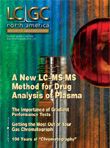Peaks of Interest
News from the Chromatography industry.
Bruker Daltonics obtains Russian Medical Device Registration
Bruker Daltonics Inc. (Billerica, Massachusetts) announced that it has obtained registration of its MALDI-TOF product line of microflex, autoflex TOF or TOF/TOF, and ultraflex TOF/TOF mass spectrometers as medical devices from the Ministry of Health and Social Development of the Russian Federation.
MALDI-TOF mass spectrometry is increasingly being applied as a clinical research tool in biomarker discovery, clinical proteomics, functional genomics, molecular imaging, and microorganism identification. Bruker Daltonics now has registered its flex series MALDI-TOF mass spectrometers as medical devices in the Russian Federation, to facilitate upcoming regulatory approvals of novel mass-spectrometry based upon in vitro diagnostic assays by its Russian customers.
Eksigent appoints new CEO
Eksigent Technologies, LLC (Dublin, California) announced that David Weber has joined the company as CEO, president, and director.
Weber joins the company from Stratagene Corporation (San Diego, California), where he was vice-president of Global Marketing and Business Development.
Weber brings 30 years experience in the life science and biotechnology industries, with sales and marketing positions at companies ranging in size from start-up to over $300 million in annual sales.
PerkinElmer acquires Spectral Genomics
PerkinElmer, Inc. (Shelton, Connecticut) announced the acquisition of Spectral Genomics, Inc. (Houston, Texas), a leading company in molecular karyotyping technology used to evaluate chromosomal abnormalities.
Spectral Genomics' array products and analysis software help pharmaceutical, biotechnology, cytogenetic, and clinical researchers identify chromosomal abnormalities related to the study of cancer and pre- and post-natal genetic disorders. The company's proprietary Array CGH provides high-resolution global views of the human genome, enabling researchers to identify the exact location of any chromosomal deletions and amplifications that can cause an increased risk of genetic disease.
Thermo acquires Fisher Scientific
Thermo Electron (Waltham, Massachusetts) announced the acquisition of Fisher Scientific International Inc. (Pittsburgh, Pennsylvania).
"The combined 'Thermo Fisher Scientific,' which sees more than $9 billion in 2007 revenue, will have a 7500-member sales force. Meanwhile, the lab supply industry at large, worth an estimated $20 billion to $25 billion in annual sales, remains largely 'fragmented' with pharmaceutical and biotechnology customers demanding more one-stop shopping," said John Sullivan, an analyst with Leerink Swan & Co.

New TRC Facility Accelerates Innovation and Delivery
April 25th 2025We’ve expanded our capabilities with a state-of-the-art, 200,000 sq ft TRC facility in Toronto, completed in 2024 and staffed by over 100 PhD- and MSc-level scientists. This investment enables the development of more innovative compounds, a broader catalogue and custom offering, and streamlined operations for faster delivery. • Our extensive range of over 100,000 high-quality research chemicals—including APIs, metabolites, and impurities in both native and stable isotope-labelled forms—provides essential tools for uncovering molecular disease mechanisms and exploring new opportunities for therapeutic intervention.
New Guide: Characterising Impurity Standards – What Defines “Good Enough?”
April 25th 2025Impurity reference standards (IRSs) are essential for accurately identifying and quantifying impurities in pharmaceutical development and manufacturing. Yet, with limited regulatory guidance on how much characterisation is truly required for different applications, selecting the right standard can be challenging. To help, LGC has developed a new interactive multimedia guide, packed with expert insights to support your decision-making and give you greater confidence when choosing the right IRS for your specific needs.

.png&w=3840&q=75)

.png&w=3840&q=75)



.png&w=3840&q=75)



.png&w=3840&q=75)










